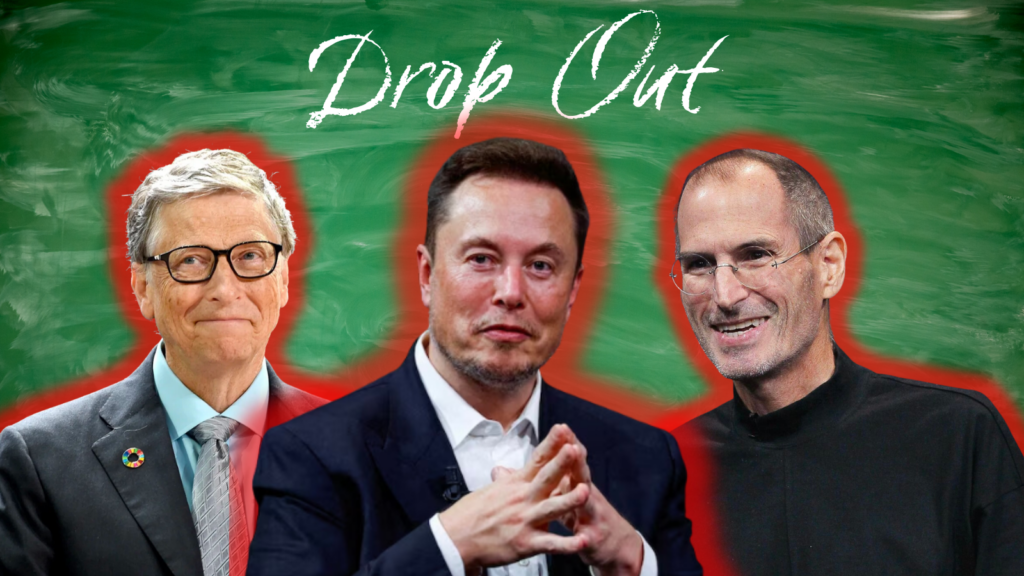
TL;DR: As confidence in the traditional schooling system wanes amidst declining grade averages, political indoctrination, and various challenges, there emerges a contrasting narrative. Visionaries like Bill Gates, Elon Musk, and Jihan Jobs showcase that bypassing the conventional educational route can still lead to monumental success. Their stories serve as powerful testimonies, suggesting that alternative learning paths might be the new blueprint for the ambitious innovators of the future.
Americans are losing confidence in the traditional schooling system. Instances of political indoctrination, declining grade averages, and other challenges are driving this skepticism. Yet, amidst this uncertainty, examples of self-starters who rejected traditional education paths in favor of chasing their dreams are emerging. The narratives of Gates, Musk, and Jobs are testimonies that validate the efficacy of alternative learning routes.
From Classrooms to Tech Giants: The Gates, Musk, and Jobs Chronicles
Bill Gates chose to depart Harvard to initiate Microsoft, Elon Musk left Stanford merely days after joining to delve into internet ventures, while Steve Jobs decided to drop out of Reed College, later co-founding Apple. Their trajectories underscore the point that the classic education route isn’t always the best option for everyone, especially those with immense ambition and vision.
Bridging The Gap: Self-Educating in a Digital Age
Our digital age offers unprecedented resources for self-education. Here’s how young innovators can tap into these platforms:
Stack Overflow — A Developer’s Playground

Communities like Stack Overflow aren’t merely question-answer forums. They represent a paradigm shift in how developers learn, engage, and grow. With CEO Prashanth Chandrasekar indicating an expansion towards educational certifications, Stack Overflow is clearly more than just a problem-solving platform; it’s evolving into an educational hub.
GitHub — The Power of Collaborative Coding
GitHub extends beyond just being a code repository. It instills the essence of collaboration among developers. By hosting major open-source projects, it serves as a platform for shared growth and learning. More so, it can effectively function as a portfolio, proving your coding credentials to potential employers.
Learning in the Field: Real-world vs. Classroom
There’s an evident gap between theoretical learning and practical application. While educational institutions might equip individuals with foundational knowledge, the crux of many lessons is best understood when faced with real-world challenges.
Navigating the Digital Era
With the rapid advancements in artificial intelligence, like ChatGPT’s abilities to craft intricate essays and even write code, the future appears both exhilarating and overwhelming. For young minds planning their post-high school journeys, visualizing the next two decades can be a daunting endeavor.
Final Musings
For the budding developers and innovators of this generation, it’s pivotal to recognize that learning isn’t confined to classrooms. The digital realm provides a myriad of resources, forums, and tools, facilitating an expansive learning experience. By intertwining formal education with self-directed online exploration, young minds can mold a vibrant, comprehensive, and rewarding career in development.
The path to changing the world rarely follows a straight line. Visionaries like Jobs, Gates and Musk forged their own trails by leaving prestigious institutions to pursue their passions. Their hustle and hunger couldn’t be contained by the walls of a classroom or stifled by waiting for permission.
Thank you for reading “Are Young Innovators and Entrepreneurs Better Off Dropping Out of School?“.
- Subscribe to our newsletter: Consensus Protocol
- Follow us on Twitter: Twitter
Sources:
- Americans have lost trust in public schools
- Musk, E. (2014, May 16). USC Commencement Speech. University of Southern California.
- Gates, B. (n.d.). Bill Gates: Of Mind and Money. Seattle Post-Intelligencer Newspaper.
- Jobs, S. (2005, June 12). “You’ve got to find what you love,” Jobs says. Stanford News.
- Chandrasekar, P. (2021, August 10). The Future of Stack Overflow. Stack Overflow Blog.




